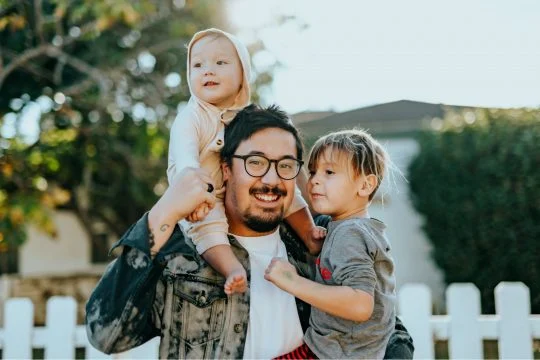J2 Visa (Dependents of J1 Visa)
You may obtain a J2 visa if you wish to accompany or join a J1 family member in the U.S. Learn more about the requirements and process of getting the J2 dependent visa for the Exchange Visitor Program.
Contact us today via +1 844 290 6312 or +443334149244 for immediate help on your U.S. citizenship immigration processing. Our lawyers are always available to help you in person, via the phone, or online.
Read our 1001 reviews
Request a call back from our immigration experts
Benefits of Choosing IAS‘ USA Immigration Lawyers
When it comes to obtaining a USA visa or permit, IAS USA immigration lawyers are well-equipped to help you.
With IAS’s track record of successfully helping clients visit or immigrate to the United States, we can help businesses and individuals achieve their goals.
Our dedicated immigration lawyers provide our services through a comprehensive and personalised approach. With IAS, you enjoy:

Compassionate support from an experienced immigration lawyer dedicated to your success



Support in gathering supporting documents and completing a high-quality application.



Confidence that your case is being handled by an experienced team.



In-house document checks done by lawyers who are well-versed in US immigration matters.
Services we Provide
What is a J2 Visa?
The J2 is a nonimmigrant visa and a “derivative” of the J1 Exchange Visitors visa. It’s a dependent visa and allows immediate relatives to accompany a J1 primary visa holder. Immediate relatives refer to unmarried children who are below 21 and spouses of a J1 visa beneficiary. As a dependent visa, any changes to the J1 status affect the J2 status.
There are different J1 visa classifications, and each has its own J2 rules. Also, not all J1 classifications support J2 visas. Some examples include camp counsellor, high school student, work and travel participant, and au pair visa classifications.
This is because the U.S. government does not specify any objectives for it. You may have a J2 dependent with a J1 visa in those classifications only if your program sponsor or program authorizes it.
J2 visas have no annual issuing cap. Relatives, no matter how many, can apply so long as they meet the requirements. J2 visa holders can study and work in the United States under specific conditions.
Who is eligible for the J2 Visa?
To qualify for a J2 visa, you must meet the following requirements:
- Be the spouse of a J1 visa holder
- Be the unmarried child of a J1 visa holder and under the age of 21.
- Must be permitted to accompany a J1 visa holder from their sponsor or program.
These are the general requirements for the J2 visa. There may also be certain case-specific requirements depending on the program and sponsor.
As a spouse, you cannot apply for a J2 dependent visa unless you are married to the J1 visa holder and have genuine proof of marriage. In other words, those in dating relationships and partnerships can’t apply for a J2 visa.
In such situations, it could be possible to still join your partner by applying for the B2 Visitor Visa. You can apply with the intent of coming to visit family members and friends in the U.S. The major requirement is that you have the financial backing to support your stay.
How to apply for the J2 visa?
The J2 visa application is not very different from that of the principal J1 visa. The J1 visa sponsor just has to file different DS-2019 forms for each J2 applicant.
The Form DS-2019 includes details of the sponsor and exchange visitor. It also describes the program, including start and finishes dates, visa category, and estimated cost.
You have to fill and submit the nonimmigrant Form DS-160 online. The embassy will only start the processing after you pay your application fee. You’ll also have to submit all your documents.
After processing, you’ll get an interview appointment date to attend a visa interview at the embassy. At the interview, a consulate officer will ask about your plans in the U.S., your relationship with the J1 visa holder, and your finances.
Furthermore, you need to go for a medical examination and vaccination if necessary. The embassy typically recommends a doctor or clinic. They won’t accept your medical examination if you do it somewhere else.
You’ll get your J2 visa if the officer finds your interview satisfactory. With the visa, you can’t travel before the J1 visa holder. It’s either you travel at the same time with the J1 holder, or you travel later to join them in the United States.
J2 Visa Application Fees
The following fees are generally required for the J2 visa application process:
- DS-160 filing fee: $185.00
Since the J1 employer will file the DS-2019 on your behalf, they could also pay the SEVIS fee. If the U.S. embassy grants your visa, you may also have to pay a visa issuing fee depending on your country.


Documents You’ll Need
For your J2 visa application, you may have to provide the following documents at your interview:
- DS-160 confirmation page with barcode
- Visa fee receipt
- Interview confirmation letter
- International passport valid for at least six months beyond your intended period of stay in the U.S.
- Passport-photograph according to U.S. visa standards
- Your DS-2019 form confirmation
- DS-2019 form confirmation of the J1 visa beneficiary
- DS-7002 form confirmation for J1 intern or trainee classifications
- Marriage certificate for the spouse of the J1 visa holder
- Copy of affidavit and photos with witnesses if married at the registrar
- Wedding album and cards
- Childbirth certificates for unmarried children under 21
- Proof of sufficient financial means to cover expenditures
J2 Visa Validity
The J2 visa is valid for the same period as the J1 visa. For example, a J2 visa will be valid for two years if the J1 visa is valid for two years.
If the J1 visa holder applies for and receives a visa extension, the J2 visa holder is also eligible for the same length of the extension. After approval, you will receive a new DS-2019 form.
Most J1 visa categories require two years of home residency, and the same applies to J2 dependents. Two-year home residency means that you must return to your country and stay for two years before applying for the same or a similar visa.
As a J2 visa holder, you may change your status to another nonimmigrant visa if the two-year home residency requirement doesn’t apply to the J1 category. Some J1 holders are also allowed to apply for a waiver to waive the mandatory home residency requirement. If the J1 visa is granted a waiver, the same waiver applies to you as their J2 dependent.
With the waiver, you may change your status if you find a job that qualifies you for a different visa like the H-1B visa. You may also become a green card holder to permanently live and work in the United States. This is because if the J1 holder qualifies for a green card, you as their J2 dependent automatically becomes eligible to apply for a green card as well.
How long does J2 Visa processing take?
The processing time for a J2 visa varies depending on a variety of factors. Notably, the workload at the embassy where you applied plays a major role. Another major factor is your country of residence.
The J1 visa processing time can also affect your J2 if applied together. A J1 visa takes about a week to two to process, and you could get your J2 visa within this time too.
However, if you apply for J2 differently or after processing the J1, it could take around 30 days to process. In most cases, the sooner you file for your J2 visa, the better.


How to get a work permit for a J2 Visa holder
As a J2 visa holder, you are eligible to work in the United States if you acquire a permit from USCIS. If the income from the job is not to support the J1 family member with whom the J2 is linked, then you can apply for the work permit.
The procedure is fairly simple. You mainly have to file an application for employment authorization to USCIS with Form I-765 and pay the filing fee. In addition to the form, you’ll provide other documents, including your DS-2019, J1 DS-2019, international passport copy, and passport photographs.
The address where you’ll file will be in Form I-765. Generally, you either file to the USCIS Phoenix Lockbox or the USCIS Dallas Lockbox.
If approved, the USCIS will issue you an Employment Authorization Document (EAD). An EAD application can take around 90 days to process, and the document is usually valid for a year or until the end date indicated on the DS-2019 – whichever comes first.
You can renew your EAD upon expiration, and it’s advised that you apply for renewal four months before expiration. With your EAD, you may also apply for a Social Security number (SSN).
Can you study on a J2 Visa?
J2 Visa holders may be permitted to enrol in academic programs as degree-seeking students.
You can enrol in any academic program, full-time or part-time. Notably, you should not apply to a school that requires relocation since you must reside with the J1 visa holder as a dependent.
If you haven’t finished your studies by the time your J2 visa expires, you may apply for a change to an F1 student visa. Your immigration status must be exempt from the two-year home residency requirement to apply for a status change.
How can IAS help?
Consulting an immigration lawyer can make your J2 Visa petition easier and give you higher chances of your application being successful.
If you wish to transition to different immigration status, it is essential to choose the best path to follow. You must accurately complete your application forms, as often this will be your only opportunity to seek residence in the U.S.
Our legal guidance includes:
- Check if your details have been included in the main J1 Visa petition;
- Confirming your eligibility for the J2 Visa;
- Determine the right immigrant visa for you if you wish to adjust your nonimmigrant status.
You can arrange your first meeting with your lawyer to talk about how our citizenship and immigration services can help by calling us or +1 844 290 6312 or using our online contact form.
Table of Contents
Table of Contents will appear here.Legal Disclaimer
The information provided is for general informational purposes only and does not constitute legal advice. While we make every effort to ensure accuracy, the law may change, and the information may not reflect the most current legal developments. No warranty is given regarding the accuracy or completeness of the information, and we do not accept liability in such cases. We recommend consulting with a qualified lawyer at Immigration Advice Service before making any decisions based on the content provided.
Frequently Asked Questions
The J1 visa holder or sponsor must show they can financially sustain all J2 dependents without a J2 dependent’s income.
It is not compulsory for a J2 applicant to apply for a visa at the same time as the J1 beneficiary. They may apply for visas after the J1 applicant. However, applying for visas together may help dependents because separate interviews may attract additional expenses.
The J1 holder’s program length determines your duration. Hence, your DS-2019 expiration date will match the J1 holder’s DS-2019 expiration date. After your program finishes, you will have 30 days grace period to remain in the U.S. You must depart the U.S. on or before the end of the grace period.
As a J2 visa holder, you may travel on your own without the J1 holder after you receive a travel validation signature. A J2 holder can spend as much time as they like outside the U.S. You can always return so long as your visa is valid and the J1 family member is in the U.S. Whenever you’re traveling out, make sure you have all the necessary exit and re-entry documents with you.
J2 visa holders can work in the U.S., but they will have to process and obtain a work permit known as an employment authorization document (EAD). The EAD process is after you have arrived in the U.S. You will have to file Form I-765, and pay the filing fee .


What our clients are saying
How our UK Immigration Lawyers can help
At the Immigration Advice Service our lawyers specialise in a wide range of UK visas, nationality and asylum applications and have represented clients in various successful complex and high-profile cases.















